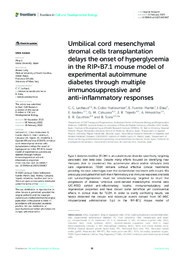Por favor, use este identificador para citar o enlazar este ítem:
https://hdl.handle.net/11000/34719Registro completo de metadatos
| Campo DC | Valor | Lengua/Idioma |
|---|---|---|
| dc.contributor.author | Lachaud, C.C. | - |
| dc.contributor.author | Cobo-Vuilleumier, Nadia | - |
| dc.contributor.author | Fuente-Martin | - |
| dc.contributor.author | Diaz, I. | - |
| dc.contributor.author | Andreu, E. | - |
| dc.contributor.author | Cahuana, Gladys | - |
| dc.contributor.author | Tejedo, J.R. | - |
| dc.contributor.author | Hmadcha, Abdelkrim | - |
| dc.contributor.author | Gauthier, B.R. | - |
| dc.contributor.author | Soria | - |
| dc.contributor.other | Departamentos de la UMH::Física Aplicada | es_ES |
| dc.date.accessioned | 2025-01-16T18:51:49Z | - |
| dc.date.available | 2025-01-16T18:51:49Z | - |
| dc.date.created | 2023-02-15 | - |
| dc.identifier.citation | Front Cell Dev Biol. 2023 Feb 15:11:1089817 | es_ES |
| dc.identifier.issn | 2296-634X | - |
| dc.identifier.uri | https://hdl.handle.net/11000/34719 | - |
| dc.description.abstract | Type 1 diabetes mellitus (T1DM) is an autoimmune disorder specifically targeting pancreatic islet beta cells. Despite many efforts focused on identifying new therapies able to counteract this autoimmune attack and/or stimulate beta cells regeneration, TD1M remains without effective clinical treatments providing no clear advantages over the conventional treatment with insulin. We previously postulated that both the inflammatory and immune responses and beta cell survival/regeneration must be simultaneously targeted to blunt the progression of disease. Umbilical cord-derived mesenchymal stromal cells (UC-MSC) exhibit anti-inflammatory, trophic, immunomodulatory and regenerative properties and have shown some beneficial yet controversial effects in clinical trials for T1DM. In order to clarify conflicting results, we herein dissected the cellular and molecular events derived from UC-MSC intraperitoneal administration (i.p.) in the RIP-B7.1 mouse model of experimental autoimmune diabetes. Intraperitoneal (i.p.) transplantation of heterologous mouse UC-MSC delayed the onset of diabetes in RIP-B7.1 mice. Importantly, UC-MSC i. p. transplantation led to a strong peritoneal recruitment of myeloid-derived suppressor cells (MDSC) followed by multiple T-, B- and myeloid cells immunosuppressive responses in peritoneal fluid cells, spleen, pancreatic lymph nodes and the pancreas, which displayed significantly reduced insulitis and pancreatic infiltration of T and B Cells and pro-inflammatory macrophages. Altogether, these results suggest that UC-MSC i. p. transplantation can block or delay the development of hyperglycemia through suppression of inflammation and the immune attack. | es_ES |
| dc.format | application/pdf | es_ES |
| dc.format.extent | 17 | es_ES |
| dc.language.iso | eng | es_ES |
| dc.publisher | Frontiers Media S.A | es_ES |
| dc.rights | info:eu-repo/semantics/openAccess | es_ES |
| dc.rights | Attribution-NonCommercial-NoDerivatives 4.0 Internacional | * |
| dc.rights | Attribution-NonCommercial-NoDerivatives 4.0 Internacional | * |
| dc.rights.uri | http://creativecommons.org/licenses/by-nc-nd/4.0/ | * |
| dc.subject | experimental autoimmune diabetes | es_ES |
| dc.subject | intraperitoneal transplantation | es_ES |
| dc.subject | inflammation | es_ES |
| dc.subject | immunomodulation | es_ES |
| dc.subject | insulitis | es_ES |
| dc.subject | Type I diabetes mellitus | es_ES |
| dc.subject | RIP-B7.1 | es_ES |
| dc.subject | UC-MSC | es_ES |
| dc.title | Umbilical cord mesenchymal stromal cells transplantation delays the onset of hyperglycemia in the RIP-B7.1 mouse model of experimental autoinmune diabetes through multiple immunosuppressive and anti-inflammatory responses | es_ES |
| dc.type | info:eu-repo/semantics/article | es_ES |
| dc.contributor.institute | Institutos de la UMH::Instituto de Bioingeniería | es_ES |
| dc.relation.publisherversion | 10.3389/fcell.2023.1089817 | es_ES |

Ver/Abrir:
Umbilical cord mesenchymal stromal cells transplantation delays the onset of hyperglycemia in the RIP-B7.1 mouse.pdf
4,77 MB
Adobe PDF
Compartir:
 La licencia se describe como: Atribución-NonComercial-NoDerivada 4.0 Internacional.
La licencia se describe como: Atribución-NonComercial-NoDerivada 4.0 Internacional.
.png)